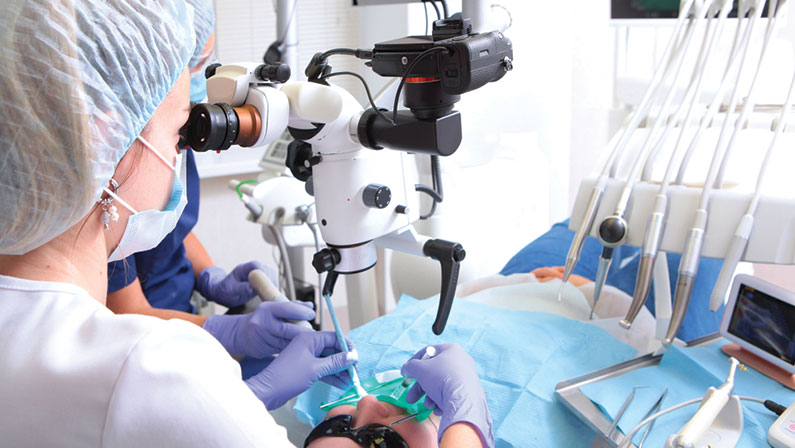Maintaining optimal oral health is not only crucial for a confident smile but also for your overall well-being. While regular brushing, flossing, and dental check-ups are essential, there are instances when a deeper level of cleaning is necessary to ensure the health of your teeth and gums. This is where deep cleaning teeth, also known as dental deep cleaning or scaling and root planing, comes into play.
In this comprehensive guide, we will explore everything you need to know about deep cleaning teeth, from understanding the differences between dental deep cleaning and regular cleaning to the steps involved in the process.
What is deep teeth cleaning?
Deep teeth cleaning, also known as periodontal scaling and root planing, is a specialized dental procedure specifically designed to address gum disease and halt its progression. While regular dental cleanings focus on removing surface-level plaque and tartar, deep cleaning goes beyond the visible areas, targeting the buildup of plaque, tartar, and bacteria from both above and below the gumline.
This meticulous and thorough cleaning is essential in eliminating the hidden pockets of bacteria where gum disease thrives. By removing these harmful substances, deep teeth cleaning promotes gum health, reduces inflammation, and helps prevent further damage to the supporting structures of your teeth.
How is dental deep cleaning different from a regular cleaning?
Regular dental cleanings are essential for maintaining good oral health and preventing common dental issues. These cleanings typically focus on removing surface-level plaque and tartar from the visible areas of your teeth. However, when gum disease is present, a regular cleaning may not be sufficient to address the underlying problem.
Deep cleaning, on the other hand, takes a more comprehensive approach. It is specifically designed to combat gum disease and goes beyond the surface level. Deep cleaning targets the areas below the gumline, where bacteria and tartar can accumulate and contribute to gum inflammation and infection.
During a deep cleaning procedure, known as scaling and root planing, your dentist or dental hygienist will carefully remove plaque, tartar, and bacteria from both above and below the gumline. This thorough cleaning reaches the hidden pockets where infection-causing bacteria thrive, allowing for effective elimination of these harmful substances. By addressing the underlying causes of gum disease, deep cleaning promotes the healing of gum tissues, reduces inflammation, and helps restore optimal gum health.
How Deep Teeth Cleaning Works
Deep teeth cleaning is a highly effective dental procedure that involves a multi-step process to ensure thorough treatment and restoration of gum health.

Let’s explore what’s involved in the process of deep teeth cleaning:
What’s Involved in the Process of Deep Teeth Cleaning?
1. Examination: The first step in deep teeth cleaning is a comprehensive examination conducted by your dentist. During this examination, your dentist will carefully assess the condition of your teeth and gums. They will measure the depth of periodontal pockets, which are spaces between the gums and teeth, to determine the severity of gum disease. This examination helps your dentist create a personalized treatment plan tailored to your specific needs.
2. Scaling: After the examination, the next step is scaling. Using specialized dental instruments, such as ultrasonic scalers or hand scalers, your dentist or dental hygienist will skillfully remove plaque, tartar, and bacteria from the surfaces of your teeth and below the gumline. Scaling is crucial for eliminating the buildup of harmful substances that contribute to gum disease. It also helps create a clean and smooth surface for the gums to reattach to the teeth.
3. Root Planing: Once the scaling is complete, the focus shifts to root planing. This step involves carefully smoothing the roots of your teeth to remove any rough areas or deposits. By making the tooth roots smooth, your dentist aims to discourage the accumulation of plaque and tartar, which can lead to future gum problems. Root planing promotes gum reattachment, reduces pocket depth, and aids in the healing process of the gum tissues.
4. Antibacterial Rinse: Following scaling and root planing, your dentist may recommend an antibacterial rinse. This rinse contains special solutions designed to eliminate any remaining bacteria and further promote healing of the treated areas. The antibacterial rinse helps control bacterial growth, reduce inflammation, and enhance the overall healing process of the gums.
5. Follow-Up Visits: Depending on the severity of your gum disease, multiple follow-up visits may be necessary to complete the deep cleaning procedure. These visits allow your dentist to monitor your progress, assess the healing of your gums, and provide any additional treatments or recommendations as needed. Regular follow-up visits are crucial for maintaining the health of your gums and preventing the recurrence of gum disease.
Is deep cleaning teeth painful?
Deep cleaning teeth is generally not painful. During the procedure, your dentist will take steps to ensure your comfort. Local anesthesia or numbing gel may be used to numb the treated area, minimizing any potential pain or discomfort. However, it’s common to experience some sensitivity or tenderness in the treated areas after the procedure. These temporary effects can be managed with over-the-counter pain relievers, if necessary, and maintaining good oral hygiene practices. Overall, the discomfort associated with deep cleaning is typically minimal and well-tolerated by most patients.
How do I know if I need deep dental cleaning?
Determining the need for deep dental cleaning is best left to a professional dentist who can assess your oral health accurately. However, there are several signs that may indicate the necessity of this treatment:

Consistent Bad Taste or Breath
Persistent bad breath or an unpleasant taste in your mouth, despite practicing good oral hygiene, could be indicative of gum disease. Gum disease is often caused by the buildup of bacteria and plaque below the gumline. Deep cleaning helps eliminate the underlying cause of the bad breath, promoting fresher breath and improved oral health.
Separating or Loose Permanent Teeth
If you notice that your permanent teeth feel loose or are separating, it may be a sign of advanced gum disease. Gum disease can lead to the destruction of the supporting structures that hold your teeth in place. Deep cleaning is crucial in this situation as it helps remove the bacteria and plaque causing the gum disease, preventing further damage and tooth loss.
Gums That Easily Bleed
Frequent gum bleeding, especially during brushing, flossing, or eating, is a common sign of gum inflammation and infection. This condition, known as gingivitis, is often caused by the buildup of plaque and tartar below the gumline. Deep cleaning targets these problematic areas, removing the bacteria and plaque and reducing gum inflammation. As a result, bleeding gums are alleviated, and gum health is restored.
Gums That Are Swollen, Red, or Tender
Swollen, red, or tender gums are another common indication of gum inflammation, which is often a result of gum disease. Deep cleaning addresses the underlying issues, removing the bacteria and plaque that contribute to gum inflammation. By promoting gum health and reducing inflammation, deep cleaning helps alleviate these symptoms, leaving your gums healthier and more comfortable.
Gums That Have Pulled Away from Your Teeth
Gum recession, where the gums pull away from the teeth, can expose the tooth roots and lead to increased tooth sensitivity and potential tooth loss. Gum recession is commonly caused by advanced gum disease. Deep cleaning plays a vital role in treating gum recession as it removes the bacteria and plaque causing the gum disease, helping to promote gum reattachment and prevent further recession.
If you are experiencing any of these signs, it is essential to consult with your dentist for a thorough evaluation. They will assess the condition of your gums, conduct a comprehensive examination, and determine if deep dental cleaning is necessary to restore your oral health.
What are the advantages of deep cleaning teeth?
Teeth and gum disease can sometimes lead to more expensive treatments. This is why taking preventative measures is important to preserve your oral health. Here are the advantages of deep cleaning your teeth:

Stops the Advancement of Gum Disease
Deep cleaning is a crucial treatment for gum disease as it effectively stops its progression. By removing bacteria, plaque, and tartar from the tooth surfaces and below the gumline, deep cleaning helps restore gum health and prevents further damage.
Treats a Current Infection and Promotes Healing
Gum disease is caused by an infection that leads to inflammation and damage to the gums. Deep cleaning eliminates the infection-causing bacteria, promotes gum tissue healing, and reduces inflammation, supporting overall oral health.
Cleans Your Teeth Above and Below the Gumline
Regular dental cleanings focus on visible tooth surfaces and the gumline. Deep cleaning targets the areas above and below the gumline, ensuring comprehensive removal of plaque and tartar and supporting overall oral health.
Eliminates Bad Breath Caused by Gum Disease
Persistent bad breath, often associated with gum disease, can be eliminated by addressing the underlying infection through deep cleaning. This helps restore fresh breath and enhances overall oral hygiene.
Protects the Roots of Your Teeth
Gum disease can lead to gum recession, exposing the tooth roots and making them susceptible to decay and sensitivity. Deep cleaning removes bacteria and tartar buildup, helping protect the roots of your teeth and reducing sensitivity.
What are the disadvantages of deep cleaning teeth?
While deep cleaning teeth provides numerous advantages, it’s important to be aware of potential disadvantages:
May Cause Nerve Damage
In rare cases, deep cleaning may cause temporary nerve damage. Your dentist will take precautions to minimize such risks, and any discomfort or sensitivity is usually temporary and resolves on its own.
Doesn’t Guarantee Reattachment of Your Gums to Your Teeth
Deep cleaning alone may not guarantee complete gum reattachment, particularly in advanced cases of gum disease. Additional treatments may be necessary to promote gum reattachment and ensure optimal healing.
May Cause Your Gums to Recede
Gum recession can occur as a result of deep cleaning, although it is typically minimal. Your dentist will carefully monitor the process and take measures to prevent excessive gum recession.
Can Cause Infection if You Have a Compromised Immune System
If you have a compromised immune system, such as due to a medical condition or medication, deep cleaning may pose a higher risk of infection. Your dentist will consider your specific situation and take appropriate precautions.
Pain and Sensitivity
Following deep cleaning, some individuals may experience temporary discomfort or sensitivity in the treated areas. This can be managed with over-the-counter pain relievers and maintaining good oral hygiene practices.
Does deep cleaning stop gum disease?
Deep cleaning is an effective treatment for gum disease and plays a crucial role in halting its progression. However, it is essential to follow proper oral hygiene practices, attend regular dental check-ups, and maintain a healthy lifestyle to prevent the recurrence or worsening of gum disease.
How much does deep teeth cleaning cost?
The cost of deep teeth cleaning can vary depending on factors such as the severity of gum disease, the number of teeth requiring treatment, and the geographical location of the dental practice. It’s best to consult with your dentist or dental insurance provider to obtain an accurate cost estimate based on your specific needs.
Find Out More about Deep Cleanings by Consulting with Dr. Saif Shere
Deep cleaning is a vital component of maintaining optimal oral health. By addressing gum disease and preventing its progression, deep cleaning helps protect your teeth, gums, and overall well-being. If you’re in Houston and looking for professional deep cleaning teeth services, trust Dr. Saif Shere, DMD, an experienced Houston cosmetic dentist.
Dr. Shere understands the importance of deep cleaning and is dedicated to providing personalized preventive dental care. By utilizing advanced techniques and a compassionate approach, Dr. Shere ensures that each patient receives the highest level of care and achieves a healthier smile.
Schedule an appointment with Dr. Saif Shere at Brownstone Dental, located at 9824 Fondren Rd, Houston, TX, today to experience the benefits of deep cleaning. During your visit, Dr. Shere will conduct a thorough examination, discuss your oral health goals, and create a customized treatment plan tailored to your specific needs.